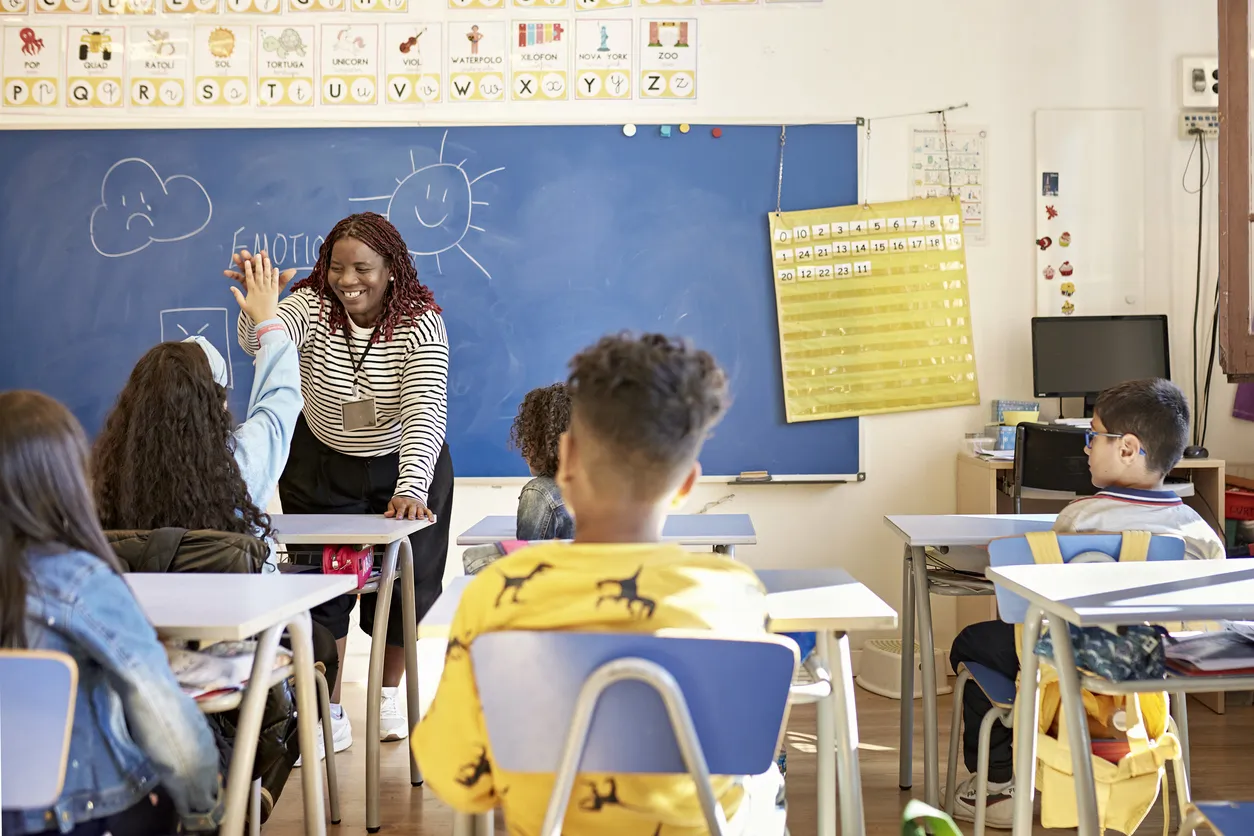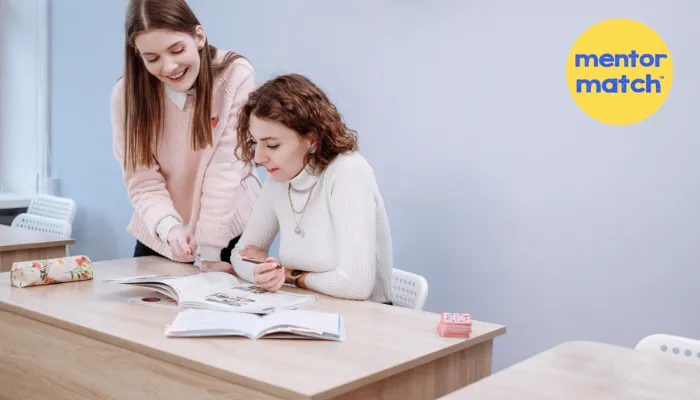
77.32% of parents see better grades in 3 months!
If you’re a parent, you’ve likely wondered,
“Does my child need a teacher or a tutor?”
Maybe parents have even Googled "tutor vs teacher" in a bit of panic before a big test or report card day.
Both are crucial for your child’s academic journey, but they serve different purposes.
As parents, we're often faced with making decisions that impact our kids' education.
Let’s break it down in a way that's simple, fun, and relatable—because we all know how much we want to make the right choice for our kids!
Teachers: The Classroom Rockstars

Teachers are like the all-around superheroes of the classroom.
They’ve got lesson plans, schedules, and a room full of kids—all with different needs.
Imagine juggling 20 soccer balls at once—that’s a teacher’s daily life!
They manage to teach, discipline, and nurture all at the same time, all while following a strict curriculum.
Think of your child’s third-grade teacher. She’s managing 25 kids every day. Some of them are whizzes at math, while others still struggle to add two and two.
Then there’s another kid, who just can’t sit still! The teacher has to make sure everyone understands the lesson—whether it’s fractions or spelling—while keeping the class focused and, let’s face it, not tearing the room apart.
Teachers are the ones guiding your child through the curriculum set by the school.
They introduce new topics, assign homework, and prepare students for tests.
But they can only give so much personal attention, and that’s where the role of a tutor comes in.
Tutors: The Personalized Study Buddy

Now, let’s talk about tutors.
Tutors are like personal trainers—but for schoolwork!
They step in when your child needs a little extra help in one or two subjects.
Unlike teachers, tutors don’t have to worry about keeping a whole class engaged.
They get to focus on just one child at a time, diving deep into whatever subject your kid is struggling with.
Parents have probably witnessed their child pulling their hair out over algebra.
They might be great at reading but can’t figure out why x and y are hanging out in math problems!
Their teacher is doing the best they can, but with a full class, your child’s not getting enough one-on-one time.
Enter the tutor.
A tutor sits with your child once a week, breaks down algebra step by step, and suddenly, a light bulb moment!—it starts to make sense.
A personalized one-on-one tutoring provides that aha moment that’s hard to achieve in a busy classroom.
Expert tutors at MentorMatch work at your child’s pace, whether that means speeding up or slowing down, giving them exactly what they need to succeed.
Now let’s dive a little deeper to understand tutor vs teacher and what exactly differentiates them.
Tutor vs Teacher: Spotting the Differences
When we talk about tutor vs teacher, it’s like comparing a coach with a specialist.
Both help your child reach their full potential, but in different ways.
Here’s how they stand apart:
1. Class Size
Teachers have classrooms filled with kids.
It’s like a soccer coach managing an entire team—some kids are stars, some are just learning how to kick.
Tutors, on the other hand, are like personal coaches focusing on just one player, helping them perfect their game.
2. Personal Attention
In a classroom, teachers have to balance their time among all students.
So, if your child needs extra help with fractions, the teacher might not have time for a detailed, step-by-step breakdown.
Tutors, however, tailor everything to your child’s needs. It’s like getting a custom-tailored suit—perfect fit, just for them!
3. Subject Expertise
Teachers are jacks-of-all-trades, teaching multiple subjects based on the curriculum.
Tutors, though, can specialize.
If your child is a math whiz but struggles with reading, a reading tutor can laser-focus on just that.
4. Pacing
Teachers move through lessons at a set pace—usually fast enough to cover everything in the school year.
If your child falls behind, it can be tough to catch up.
But tutors? They move at your child’s speed, whether they need to slow down or zoom ahead.
5. Comfort Level
Ever notice how kids are sometimes afraid to ask questions in front of the class?
They don’t want to seem “uncool” or “not smart enough.”
Tutors eliminate that fear.
It’s just them and the student, so there’s no judgment, only learning.
Now that we’ve explored tutor vs teacher, let's dive into some real-life scenarios where you might consider getting a tutor for your child.
Also Read: The Significance of Individual Attention in the Classroom
Real-Life Examples: When to Consider a Tutor
So, when does your child actually need a tutor?
In certain situations, your child may need a little extra support outside the classroom.
Here are some relatable scenarios and real-life examples of when a tutor can step in to provide that personalized attention and help your child overcome specific academic challenges.
1. Struggles in a Specific Subject
Let’s say your child is falling behind in science and the teacher’s explanations just aren’t clicking.
A tutor can swoop in, focus on those tricky topics, and help your child catch up without feeling lost in the classroom.
2. Test Prep Time
Ever have a child who gets super anxious about tests?
Maybe it’s the big state exams or the dreaded SATs.
Tutors are like academic cheerleaders—they don’t just teach content but also offer strategies to stay calm, focused, and ready to ace those tests.
3. Confidence Booster
Sometimes, it’s not about falling behind.
Maybe your child is doing okay but just needs a little extra push to feel confident.
A tutor can provide that one-on-one boost to help them feel more sure of their skills.
While tutors can be incredibly helpful in specific situations, they don't have to work alone.
In fact, a tutor and a teacher can form a powerful team to support your child’s learning.
Let’s explore how the two can work together for even better results.
Tutor vs Teacher, Can They Work Together?
Here’s a pro tip: Teachers and tutors aren’t in competition—they can actually be a dream team!
Teachers provide the foundation, and tutors help reinforce it.
If your child’s teacher notices they’re struggling with certain concepts, they might suggest a tutor for extra support.
It’s a partnership that helps your child thrive.
Emily’s story with MentorMatch is a perfect example of how tutoring can complement a teacher’s efforts.
Emily, a single mom, had been trying group classes for her son, Oliver, for a couple of years.
Despite the best efforts of his teachers, she wasn’t seeing the academic improvement she’d hoped for.
That's when a colleague recommended MentorMatch, a 1-on-1 tutoring service.
Emily was hesitant at first, concerned about the cost of personalized tutoring.
But after giving it a trial, she realized the tailored approach was exactly what Oliver needed.
In the group classes, Oliver had been missing out on key basics due to the fast pace and lack of individual attention.
His teacher was doing their best with a large classroom, but the environment wasn’t ideal for his learning style.
The 1-on-1 tutor, however, was able to rebuild Oliver’s foundation, helping him understand every concept thoroughly.
Emily noticed a dramatic shift—not only in Oliver’s academic performance but also in his confidence.
The tutor wasn’t replacing his teacher but working alongside what was already being taught in school, filling in the gaps and offering that personalized attention that teachers in larger classrooms simply can’t provide.
Emily now firmly believes that the investment in private tutoring has been worth every penny, as the impact on Oliver’s academic journey has been undeniable.
The combination of school learning with the targeted help from a tutor gave Oliver the comprehensive support he needed to thrive.
This story shows that when teachers and tutors work hand-in-hand, the results can be incredibly powerful for a child’s education.
The Big Question: Tutor or Teacher?
So, which is better—a tutor or a teacher?
The truth is, it depends on what your child needs.
If they’re doing well but just need a little help in one area, a tutor can be the perfect solution.
If they need a more structured, big-picture approach, that’s where a teacher shines.
Here’s the fun part:
You don’t have to choose one or the other.
Many kids benefit from having both!
The teacher provides the foundation, while the tutor helps fill in the gaps.
It’s like having a coach and a specialist on your child’s academic team.
Also Read: Online Tutoring for K-12 and Higher Education Students
Wrapping It Up: Tutor vs Teacher
Whether it’s a teacher guiding a class of 25 or a tutor giving your child personalized attention, both roles are essential to your child’s learning journey.
The key is knowing when to tap into each one.
Tutors and teachers don’t replace each other—they complement each other.
Think of it like building a house: the teacher lays the foundation, and the tutor adds those special touches that make it stand tall.
By understanding the difference between tutor vs teacher, you’re better equipped to make decisions that set your child up for success.
So, if you’ve ever found yourself debating between “tutor vs teacher,” why not go for both?
Your child gets the best of both worlds, and you’ll see the benefits unfold, not just in their grades but in their confidence and overall love for learning.
If you're ready to give your child that personalized edge, why not try MentorMatch? Schedule a free demo today and join the many parents who’ve already seen the impact!
Now, who doesn’t love a success story like that?



.png)
.webp)
.webp)